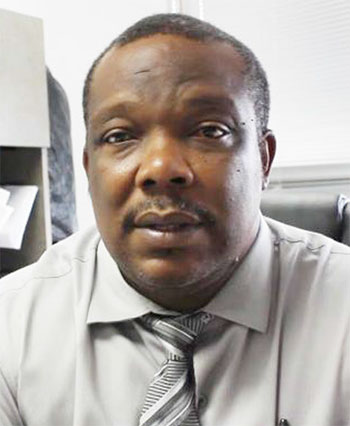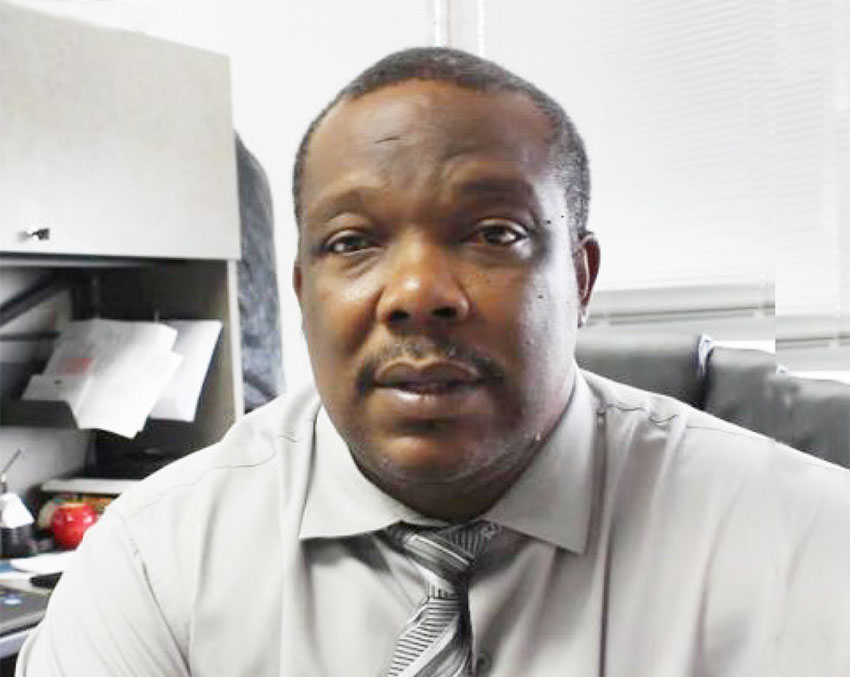CHIEF Education Officer, Marcus Edward, says his ministry should not be the scapegoat in the Ave Maria Girls Primary School fiasco as they were not the ones who fell short of doing their part.

The VOICE spoke to Edward this week in response to the week-long closure of the all- girls school and, according to him, the Ministry of Education did not drop the ball.
Edward said: “The responsibility for infrastructural works at schools is that of the Ministry of Infrastructure (MOI). We identify the needs and, in dialogue with the MOI, let them know what the needs are. They make the requests to the Ministry of Finance, (which) has the budget for school repairs and so on. But our part is to identify what has to be done, assist with the prioritisation of what has to be done and, in the end, indicate our level of satisfaction with what is done.”
The school made headlines earlier this week after children either returning to or just starting at the learning institution were sent home for the rest of the week due to the school compound not being conducive for students and teachers.
In the infant section of the school, the concrete of the freshly-restructured stairway was not set and was poorly cordoned off. There was also dust from the construction work strewn all around the classrooms and furniture.
Lingering fumes from fumigation work done three days prior to the reopening date of school had adverse effects on both students and staff.
Edward said the ministry did what it had to do early enough, including making all the recommendations to the other respective ministries. The rest, he said, was out of his control.
“The processes go beyond just the identification,” he said. “The works have to be costed, contractors have to be identified…A lot of technical activities take place thereafter and there can be delays anywhere along those lines.”
Edward added that for reasons unknown, the contractor was mobilised late to do repairs at the school and decided to start construction of a staircase on the day before school reopened.
“That, to me, was absurd, really. It was essentially unknown to us in the ministry because had I known that, I would have asked for it to be stopped. But that was done and we got the assurance from the contractor that the place would be cleaned and everything else,” he explained.
He continued: “I visited the school myself and I was not satisfied with the level of cleanliness that was there. I was not satisfied that they had sufficiently boarded off the construction area for the children to return to the school.”
It was for this reason, he said, the decision was made to close the school to allow the completion of works so that the students could return to school next Monday.
In relation to the issues with the termite infestation and the lingering fumes, Edward said this is an island-wide problem and thinks a national termite eradication programme is needed to tackle it.
Some people react to the toxic fumigation substance differently. While some will not be affected by immediate exposure to the chemicals, others will have lingering effects from exposure days later.
He said: “The persons who administered the service have indicated that after one day, persons can return to the environment. The teachers have been provided with the literature in terms of what is being used.”
Edward said he recognises and understands the frustration of the longstanding and ongoing issue of school closures, unpreparedness and facility deterioration. But the solution is not as simple as one might think, he said.
“The needs of schools are endless. Then you have to prioritise. Within schools, you have to prioritise and, of course, among schools. So a school may have a long list of issues and you would have to prioritise. You would have to take those that pose immediate threat to health and safety because those things have to be addressed and then you attend to other things,” he said.
Estimates from the MOI, he said, put the total requirement for school repairs at more than $13 million. However, he said, for the summer, only about $900,000 was available to be spent.
He said: “The work is being done in patchwork to ameliorate the conditions. It’s not the best and when you do that, you find yourself going back to the same schools year after year.
“We have always maintained that what we need to do is to spend resources and time doing some major rehab at each school, so we know that at least for the next five to ten years, we may not have to focus on that school. But, of course, it comes with the resources and finance.”
Edward said he has and will continue to make the plea to the relevant ministries and authorities for the funding for what has to be done. However, he is asking that the public — and especially the parents – to bear a little more patience.
He said he feels the process needs to be revisited to ensure that the summer holidays are used to the fullest extent to ensure that all works are carried out timely, correctly and efficiently.
“We are not happy. If you recall, the Ministry is very serious to ensure that when we open the schools, we want to show to all concerned that we are serious. Years gone by, the first day of school was a half day. We decided that this does not convey to parents and students that we are ready for school. So we stopped the half day (routine) and ensured that whether it’s the first day or last day, you are there for the day. We don’t want to send any messages that we are not ready for school.”

















The ministry of education is responsible for developing policy to ensure the proper care, management and control of all school districts, and supporting the mission of educating students to reach their full potential. The maintenance of the school building should be a daily activity of the institution and its personnel. This is a very important factor in the delivery of education. The chief education officer, along with the ministry of infrastructure (MOI) is responsible for repairs and maintenance of the physical structure and should undertake capital improvements when necessary to ensure public and private safety. Mr. Edwards reiterated the lack of a timely response from the (MOI). However he did not say when the ministry was advised of the need for structural repairs. It should be noted that students were away on vacation for eight weeks which allowed sufficient time to complete any necessary repairs. There is plenty of blame to go around because once again the children are marginalized. The Chief education must ensure that all school structures under his jurisdiction are maintained properly and that adverse conditions do not exist that can affect the health and education of our children, much less delay the opening of their school after two months of vacation. The Principle of this school has to take blame for failing her staff and the children. It is the responsibility of the principle to ensure the safety of those individuals she/he leads. Principal and staff should have met two weeks prior to the opening of school and consulted with regard to the existing problems, pressured the chief education officer, the MOI and should not have allowed students on the premises. The approach to this problem was reactive rather than pro-active. In summation better organization is necessary, more inspections and structural reviews-Internal, e g-Electrical ,External, e g-Grounds.